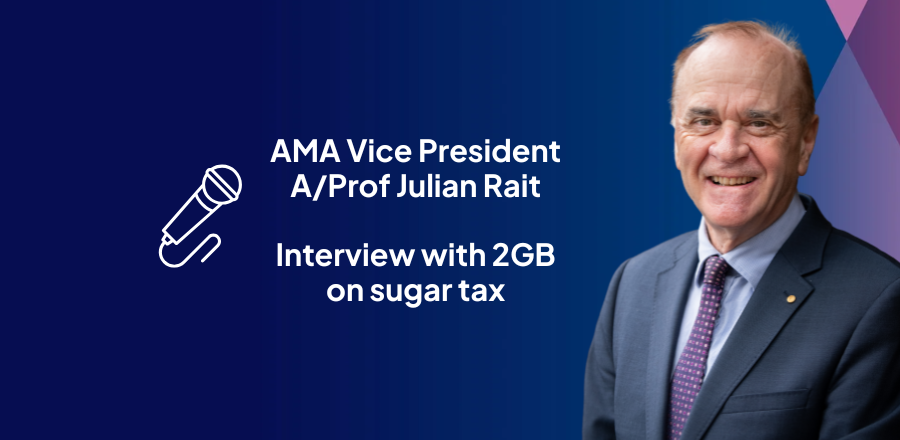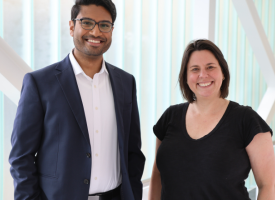Sugar tax interview: AMA Vice President Associate Professor Julian Rait on 2GB
Subject: Sugar tax proposal

JOHN STANLEY: I just want to go across Associate Professor Julian Rait. He's the Vice President of the AMA. They've put this forward. He joins us on the line now. You've heard all of that, Julian Rait. What are your prospects of getting this up and running?
A/PROF JULIAN RAIT: Well, look, the AMA is very encouraged to hear parliamentarians like Michael Freelander speak from the background of their experience. And obviously, we hope that they'll be able to encourage the government to implement such a measure. I think, as Michael indicated, that two thirds of Australians are now overweight or obese, and there's a particular problem amongst those under 25. The rate of obesity or overweight has increased from about 10 per cent in about 1990 to around 20 per cent today. And so as a result of that, we're seeing this flow-on effect of diabetes and all the complications that follow from that. I mean, I'm an ophthalmologist, so I see it from the point of view of visual impairment and blindness, and it really is shocking for me to see, as I not too often thankfully do, but I do see from time to time people that have lost vision or even become blind as a result of diabetes, and if we can prevent more cases of this, it would certainly be a great step forward.
STANLEY: Yeah. What about some of the responses I'm getting here? People talking about increasing tax on tobacco for health reasons. Well, that's obviously created a problem which people know very, very well. But the increase in price has resulted in people smoking less. It depends on whether you argue it's gone too far. Then people saying also, if I want to eat sugar, I shouldn't be told what to eat or drink.
A/PROF RAIT: Sure, but we need to have some sort of measures because obviously what we're doing at the moment isn't working. And in approximately 100 jurisdictions across the world, this has been implemented with some success, and so the sugar consumption has fallen in some of those jurisdictions quite dramatically.
Now, obviously part of the goal, we may well raise some more revenue here. You know, might be able to use those funds for other [indistinct]-
STANLEY: [Interrupts] You're saying, what, $3.6 billion potentially? It would be a lot of revenue.
A/PROF RAIT: Yeah, that's right. But equally, we hope, as Michael Freelander has suggested, we hope that manufacturers might look at the way they formulate these drinks. He pointed out quite properly that some drinks like Fanta have actually had a dramatic increase in the amount of sugar they contain. And so, this is what we're particularly concerned about. It seems as though that the manufacturers are unchecked. And, of course, sugary drinks are addictive for some individuals. Where there's sugar and often caffeine added, it can activate the brain's reward system and become addictive for some people.
STANLEY: People are saying things like- for instance, you've got the one person saying, I'll drink and eat products with natural sugar, not products with chemical artificial sugar ingredients. Some of those artificial sweeteners, they're not all that flash, are they?
A/PROF RAIT: Well, no, that's not correct, because those artificial sweeteners have been extensively studied, and the claims that you're referring to have been discredited. So, there's actually not a lot of evidence that I'm aware of, and certainly my public health people tell me, that these alternatives aren't at all toxic, or have any long-term consequences, as far as the many studies that have been done have indicated. So that's actually not true, and in fact, sugar has a much more deleterious effect on our metabolism.
If you think about it, for much of human history we've had virtually zero refined sugar. And sugarcane, although it was discovered around 2000 years ago, in the last 300 years, we've increased our sugar consumption dramatically from about five grams per day in 1700 to about 250 grams today. Now, just think about that. We've increased our sugar consumption by 50 times since 1700. And given our daily requirement is no more than 30 grams, or slightly more than 10 per cent of what we're taking in, that's absurd and that's obviously going to have a deleterious effect on our metabolism. And sure enough, we see these rising rates of obesity and diabetes as a consequence.
And the other thing is, it's not just diabetes, cardiovascular disease. We know that if you actually put on weight, you increase the risk of various types of cancer — you know, colon cancer, breast cancer, kidney cancer, all sorts of things — and that's having an enormous flow-on effect to our health system. So, it's quite proper that we have a tax in place or some measure to try and reduce the consumption of sugar. Otherwise, we're going to have a real crisis in our health system because of the unchecked number of severe cases of these diseases.
STANLEY: The other feedback I'm getting is about exercise, people not getting out enough. And if you're reducing exercise, that's a factor as well, isn't it? People not moving as much as they used to.
A/PROF RAIT: Yeah, absolutely. And exercise, obviously, daily exercise is good to prevent a whole host of diseases, not just cardiovascular disease, but dementia and other things we see as we grow older. So, we have to embark on more exercise as well. There's no doubt about that. But we know that a sugar tax in other jurisdictions has been shown to be effective, and so therefore that's why we support it. And I do welcome health leaders, particularly the head of the Health Standing Committee in Parliament, like our Dr Freelander, endorsing it.
STANLEY: Okay. Look, I've got- one of our staff here has type 1 diabetes, and they use sugary products to treat low blood sugar episodes. How would they be accommodated in this? Are they paying more, are they?
A/PROF RAIT: Well, that's a different situation. Obviously, generally, people with diabetes try to reduce their amount of sugar, but sometimes they use it to regulate it. But normally, we're talking here about type 2 diabetes, which is obviously the type of [indistinct] …
STANLEY: [Talks over] Yeah. I mean, I guess they're talking where they might get a can of Coke or something or need something, they'll be paying more for it. That's what they're saying.
A/PROF RAIT: Well, only about, as you said earlier, only about 17 cents per can, if at all. And also, we're not telling or suggesting that sugar be completely removed. We're just saying that it should be reduced. And we think that people should be moderating the amount of sugar they're having because we know that when you add sugar to drinks, it obviously makes them more attractive. And trying to reduce the consumption of sugary sweetened fizzy drinks, cordials, and juices is really what we're about here.
STANLEY: I mean, can I ask you, because I've actually reduced it myself significantly because I know the impact it has on me. I've done it voluntarily because I feel better without it. Do you do that yourself?
A/PROF RAIT: Yeah. So interestingly, I mean, I just had a cup of coffee before. I used to love sugar in my coffee. I put a sweetener in it now, one that obviously doesn't have the same impact on my health. I exercise regularly. I get out and walk the dog. I hope to do that shortly. And also, I've got an exercise bike in the winter and I try and do about 10, 20 kilometres a day on that, and that's really to just keep the blood flowing through my muscles, and that's obviously, hopefully, keeping the propensity to develop sugar-related diseases in check.
STANLEY: All right, good luck. Thank you very much for that. Associate Professor Julian Rait, he's the Vice President of the AMA.
* * END * *


